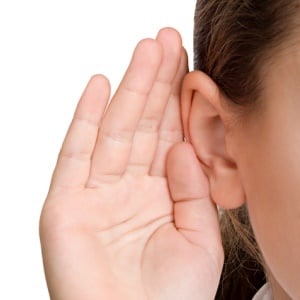
There is a general perception that humans don't hear as well as animals – mainly because they can hear many sounds we can’t.
Added to this is the fact that humans have become less dependent on their senses for survival. As hunter-gatherers, our forefathers relied on especially their sight and hearing to stay alive – which changed when humans became agriculturalists around 10 000 years ago.
Were we just never as sharp as our animal friends, is it a case of "use it or lose it", or are there other factors at play?
Loudness and pitch
According to Widex, the human audible range is dependent on the pitch (high or low) and loudness of sound. We use Hertz (Hz) to measure pitch and decibels (dB) to measure loudness.
As far as pitch is concerned, human hearing starts at about 20Hz and ends at 20 000Hz, but our hearing is most sensitive between 2 000 and 5 000Hz. The pitch of a dog whistle is too high and the roar of a wind turbine too low for humans to hear.
When it comes to loudness, in our most sensitive range humans can actually hear softer sounds than dogs and cats.
We can safely be exposed to sounds ranging from 0 to 85dB. Anything louder than that can eventually damage our hearing. An ambulance siren is about 125dB, and normal human speech around 65dB.
Hearing loss usually starts by affecting our upper pitches, which means that we will have difficulty hearing sounds like birdsong and instruments, such as flutes and piccolos. By middle age our upper range can drop to between 12 000 and 14 000Hz.
Some interesting animal hearing facts
- Dolphins do not have ears. Instead, they rely on eardrums located outside their bodies. They also use sonar, or echolocation, to enhance their already superior hearing abilities.
- Bats also utilise echolocation to determine location and size of things in the dark. In fact, they can find small insects 9m away in pitch darkness.
- Cats are able to hear higher frequencies than both humans and dogs. Their ear muscles also allow them to rotate their ears up to 180°.
- Elephants are tuned into frequencies 25 times lower than humans. Their feet and trunk also have specialised receptors for detecting low-frequency vibrations.
- Dogs can hear frequencies way above humans. That's why they know you're home long before anyone else.
- Pigeons can hear sounds as low as 0.5Hz and can detect distant storms, earthquakes and even volcanoes. Pigeons are also the best navigators in the world.
- Monkeys' hearing is slightly less acute than that of humans at frequencies below 8 000Hz, but extends up to 45 000Hz, which is an octave above the upper human limit.
In defence of modern humans
It is true that humans cannot detect sounds occurring at all frequencies – but neither can animals.
A study done by researchers at Binghamton University in New York found that early humans could hear better than both chimpanzees and modern humans at certain frequencies. They studied the anatomy and reconstructed the hearing capabilities of some of our ancestors who lived in South Africa.
The researchers found that our early ancestors were especially good at hearing frequencies between 1 500 and 3 500Hz, which would include the sounds of rustling leaves – and nowadays vacuum cleaners, telephones and hard consonants.
Instead of regressing as one might expect, modern humans' hearing ability has become even more acute in the slightly higher frequencies. In fact, as mentioned above, modern humans are proficient at hearing sounds from 2 000 to 5 000Hz, and actually fare better than other primates in that range.
Being able to excel at higher frequencies is good for “complex short-range vocal communication”. This explains why we are better at having an intimate conversation across a dinner table than grunting and howling at each other out in nature. Chimps for instance have trouble hearing some sounds we use in spoken language.
Image credit: iStock




 Publications
Publications
 Partners
Partners


















